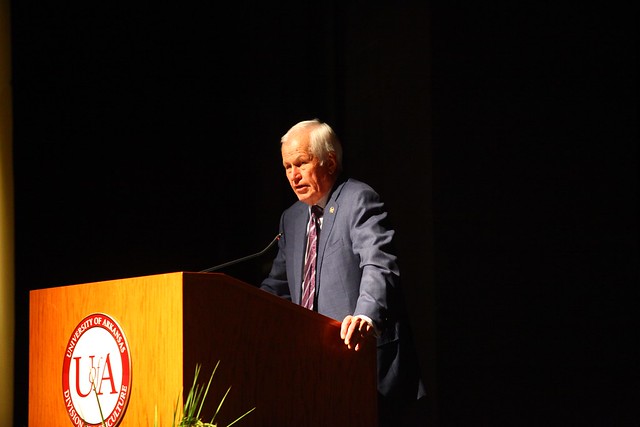Stenholm: Political system ‘absolutely broken,’ stymieing Farm Bill
By Emily Thompson
U of A System Division of Agriculture
Aug. 4, 2017
Fast Facts:
- Former Congress member speculates on the future of the Farm Bill
- Divisions in Congress and nation, coupled with a lack of compromise, make passing legislation a daunting task
(773 words)
(Download the MS Word version here.)
(Newsrooms: SUBS 5th graf to correct name of university to Tarleton, sted Charleston
with downloadable art at https://www.flickr.com/photos/uacescomm/sets/72157684568328373 )
STUTTGART, Ark. — A deeply divided Congress and nation make passing legislation, such as the Farm Bill, an increasingly difficult task, said Charlie Stenholm, former ranking member of the U.S. House Committee on Agriculture and keynote speaker at the 2017 Arkansas Rice Expo.
The seventh annual expo and the biennial Rice College, an educational event focused on crop production held Thursday, drew more than 1,000 people.
“We had a good crowd and were very pleased at the numbers who attended Rice College and took part in the tour of the research plots at the Rice Research and Extension Center,” said Mark Cochran, vice president-agriculture for the University of Arkansas System. “It was good to see such a large cross-section of people here.”
Political divisions
“Today’s political system is absolutely broken,” Stenholm said, adding that too many in Congress believe compromise is a “four-letter word,” and that compromise is the only way to pass a bill.
The former congressional representative spoke about his 26-year run in politics as a time when members from across the aisle came together to pass important legislation. In his years since leaving Congress, Stenholm has been teaching at Tarleton State University and lobbying.
“To some it’s called ‘lobbying,’ to me it’s called ‘educating,’” Stenholm said.
The current political division is one of the culprits of the Farm Bill stalemate, he said.
When asked by the audience what he thought the future holds for the Farm Bill, Stenholm said keeping the nutrition portion of the bill is key to its passage.
Harrison Pittman, director of the National Agricultural Law Center, discussed current legal and legislative issues in agriculture, among them, the Farm Bill.
“There’s still a lot of alligators in the water on the 2018 Farm Bill,” he said. “There are active efforts to split the two parts of the Farm Bill – agricultural from the SNAP programs, and that’s traditionally the coalition that gets the bill over the line.”
Ag and the law
There’s no shortage of issues for the National Agricultural Law Center to consider.
“Usually, I get up around 5 a.m. and read for about three hours” to get up to speed on what’s going on around the country, Pittman said, speaking to a small breakout session at the 2017 Arkansas Rice Expo.
“When you look at the various environmental and other interest groups filing legal action, it’s as though someone put a battle plan on the wall,” he said. “They’ve got every supply line into agriculture; crop insurance, loans, regulation under the Clean Water Act; virtually everything that goes into agriculture is under attack in some way, or there’s some serious proposal to augment or change how production agriculture is conducted and regulated.”
And none of this action stays under a bushel, he said.
“What happens in Vermont, does it say in Vermont? Does what happens in Des Moines stay in Des Moines? No,” Pittman said. “We used to think of California’s impact on the national scene, because they’re so big and have such a powerful economy – which is still true – but now, someplace as small as Vermont can have ripple effects, too.”
He cited Vermont’s passage of laws on food labeling that “forced a Congress and White House that had been fighting like cats and dogs to work together on something.”
Friendship
Among those working to promote rice at the 2017 Arkansas Rice Expo were the 10 Miss Arkansas Rice Contestants.
Alexa Lawson May, St. Francis County Rice Queen, was handing out samples of her grandmother’s chicken and rice dish. She said the Rice Expo was, for her, a chance to connect.
"I'm really excited to meet the others. Friendship is so important amongst queens,” she said. “Even if I don't win Miss Arkansas RIce, I know the friendships I make will last a lifetime."
While many of the expo events take place at the Grand Prairie Center each year, the expo also hosts field tours at the Rice Research and Extension Center.
Several growers in attendance said they came to “up their growing game.” Joe Christian, Arkansas Rice Promotion Board member and a rice farmer himself, said he was eager to learn anything to help him with his rice.
The Arkansas Rice Expo began in 2011, growing out of an annual field day for rice producers. The event expanded from the Rice Research and Extension Center to include the Grand Prairie Center, which hosts more than 100 booths with family activities, seminars and demonstrations that showcase the broad range of expertise within the University of Arkansas System Division of Agriculture.
For more information about rice production contact your county extension office or visit www.uaex.uada.edu or http://arkansascrops.com.
About the Division of Agriculture
The University of Arkansas System Division of Agriculture’s mission is to strengthen agriculture, communities, and families by connecting trusted research to the adoption of best practices. Through the Agricultural Experiment Station and the Cooperative Extension Service, the Division of Agriculture conducts research and extension work within the nation’s historic land grant education system.
Pursuant to 7 CFR § 15.3, the University of Arkansas System Division of Agriculture offers all its Extension and Research programs and services (including employment) without regard to race, color, sex, national origin, religion, age, disability, marital or veteran status, genetic information, sexual preference, pregnancy or any other legally protected status, and is an equal opportunity institution.
# # #
Media Contact: Mary Hightower
Dir. of Communication Services
U of A System Division of Agriculture
Cooperative Extension Service
(501) 671-2126
mhightower@uada.edu
Related Links
